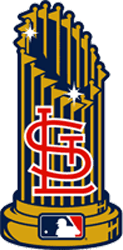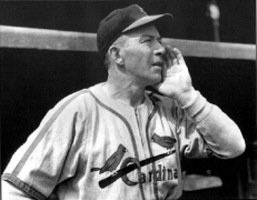Veterans elect five into Hall of Fame
Two managers, three executives comprise Class of 2008
National Baseball Hall of Fame and Museum
NASHVILLE, Tenn. -- Two voting committees have elected five managers and
executives to the National Baseball Hall of Fame through the 2008 Veterans
Committee election for managers, umpires, executives and pioneers.
Managers Billy Southworth and Dick Williams are joined by executives Barney Dreyfuss, Bowie Kuhn and Walter O'Malley as Veterans Committee selections for the class of 2008. The five electees, along with any electee(s) to emerge from the Baseball Writers' Association of America vote on January 8, will be inducted into the National Baseball Hall of Fame on Sunday, July 27, 2008, as part of Cooperstown's annual Hall of Fame Weekend. Williams is the only living electee.
Seven managers and three umpires were considered by a 16-member electorate of Hall of Fame members, current and former executives and veteran media members. Ten executives and pioneers were considered on a second ballot by a 12-member panel of Hall of Famers, current and former executives and veteran media members. Candidates who received 75 percent of the vote on either ballot earned election, with voters asked to vote for zero to four candidates on each ballot. Each committee met Sunday here in Nashville, Tenn., at the Winter Meetings, reviewing the credentials of each candidate before casting individual paper ballots. The results of the 2008 Veterans Committee balloting:
Managers/Umpires Ballot results (by vote percentage): *Billy Southworth (81.3%), *Dick Williams (81.3%), Doug Harvey (68.8%), Whitey Herzog (68.8%), Danny Murtaugh (37.5%) and Hank O'Day (25%). Davey Johnson, Billy Martin, Gene Mauch and Cy Rigler each received fewer than three votes. (* earned election to the Hall of Fame)
Executives/Pioneers Ballot results (vote percentage): *Barney Dreyfuss (83%), *Bowie Kuhn (83%), *Walter O'Malley (75%), Ewing Kauffman (41.7%), John Fetzer (33.3%), Bob Howsam (25%) and Marvin Miller (25%). Buzzie Bavasi, John McHale and Gabe Paul each received fewer than three votes. (*earned election to the Hall of Fame)
The five electees mark the first selections by the Hall of Fame's Veterans Committee since 2001, when Hilton Smith and Bill Mazeroski were elected to the National Baseball Hall of Fame. Elections in 2003 and 2007 for managers, umpires, executives and pioneers did not produce an electee, under a different election process than the current, revamped process.
Southworth managed for 13 seasons (1929, 1940-51), including seven with the Cardinals and six with the Braves, posting a .597 winning percentage, fifth-best all-time, with a record of 1,044-704. Southworth guided his teams to four World Series appearances and two World Championships, posting a winning record in 10 of his 13 seasons, including three straight seasons of 105 wins or more, from 1942 to 1944 with St. Louis.
Williams managed for 21 seasons with six different teams, recording 1,571 wins against 1,451 losses, a .520 winning percentage, winning four pennants and two World Series. Williams guided the 1972 and 1973 A's to World Series titles, also taking the 1967 Boston Red Sox and the 1984 San Diego Padres to the World Series.
Dreyfuss totaled 43 years of service in baseball as an influential team owner and policy maker, as the first owner of the Pittsburgh Pirates. Following a 10-year tenure as part-owner of the Louisville Colonels in the American Association, Dreyfuss brought 14 players with him to the Pirates, including Hall of Famers Honus Wagner, Fred Clarke and Rube Waddell. Overall, his teams won six pennants and two World Series (1909, 1925), as he is considered one of the fathers of the modern World Series, bringing the Series to reality in 1903 as the owner of the Pirates.
Kuhn served as the fifth commissioner of Major League Baseball from 1969-84. During his tenure, MLB attendance tripled and lucrative television contracts followed, on the heels of the introduction of night-time baseball to the World Series. Kuhn is the first former commissioner elected to the National Baseball Hall of Fame since Happy Chandler earned election in 1982.
O'Malley is noted as perhaps the most influential owner of baseball's early expansion era, as owner of the Brooklyn and later, Los Angeles Dodgers. Gaining control of the Dodgers in 1950, O'Malley led the club to four pennants and a World Series title in his first seven years, before leading baseball's expansion west of the Mississippi, relocating the team to Los Angeles.
The 16-member electorate charged with reviewing the Managers/Umpires ballot featured Hall of Famers Jim Bunning, Bob Gibson, Fergie Jenkins, Al Kaline, Tom Lasorda, Phil Niekro, Tony Perez, Earl Weaver and Billy Williams; former executive Jim Frey; current executives Roland Hemond (Diamondbacks) and Bob Watson (Major League Baseball); and veteran media members Hal McCoy (Dayton Daily News), Jack O'Connell (MLB.com), Tim Kurkjian (ESPN) and Tom Verducci (Sports Illustrated).
The 12-member electorate that reviewed the Executives/Pioneers ballot featured Hall of Famers Monte Irvin and Harmon Killebrew; former executives Bobby Brown (American League) and John Harrington (Red Sox); current executives Jerry Bell (Twins), Bill DeWitt (Cardinals), Bill Giles (Phillies), David Glass (Royals) and Andy MacPhail (Orioles); and veteran media members Paul Hagen (Philadelphia Daily News), Rick Hummel (St. Louis Post-Dispatch) and Hal McCoy (Dayton Daily News).
The final Managers/Umpires ballot was developed by a Baseball Writers' Association of America (BBWAA) appointed Historical Overview Committee, comprised of 11 veteran members: Dave Van Dyck (Chicago Tribune); Bob Elliott (Toronto Sun); Rick Hummel (St. Louis Post-Dispatch); Steve Hirdt (Elias Sports Bureau); Moss Klein (Newark Star-Ledger); Bill Madden (New York Daily News); Ken Nigro, (formerly Baltimore Sun); Jack O'Connell (MLB.com); Nick Peters (Sacramento Bee); Tracy Ringolsby (Rocky Mountain News); and Mark Whicker (Orange County Register). The final Executives/Pioneers ballot was developed by the executive voting committee, which considered both retired executives and active executives age 65 or older.
The Baseball Hall of Fame Committee on Baseball Veterans now has four ballots. The Managers/Umpires ballot and the Executive ballot are considered every other year starting with the 2008 Induction year. Players whose careers spanned a period beginning in 1943 will be considered every other year starting with the 2009 Induction year. Players whose careers began before 1943 will be considered every five years, beginning with the 2009 Induction year.
All Hall of Fame members will vote on 1943-and-beyond players in late 2008 for the 2009 Induction year. A special 12-member committee, yet to be appointed, will vote on players whose careers began prior to 1943 at the Winter Meetings in December 2008 for the 2009 Induction year. Ballots for both the pre-1943 and 1943-and-beyond elections will be crafted and released in Fall 2008.
At its July meeting, the Hall of Fame Board of Directors voted to restructure the Committee on Baseball Veterans and its procedures for electing long-retired players, managers, umpires and executives/pioneers. The changes maintain the high standards for earning election to the Hall of Fame, while the voting process will change, becoming three separate ballots -- players, managers/umpires, and executives/pioneers -- reviewed by three separate electorates. In addition, a special committee will review the candidacies of players whose careers began prior to 1943.
"Historically, the Veterans Committee has continually evolved since its inception in 1936," said Jane Forbes Clark, chairman of the board for the National Baseball Hall of Fame and Museum. "These newest changes uphold our belief that players should have a Veterans Committee review, while also recognizing the unique analysis needed for managers, executives and umpires. We believe that these new procedures and restructured committees will allow for more open dialogue among those who vote, promoting a more intensive study of player candidacies. The Board has always maintained that the standards for election to the Baseball Hall of Fame must remain very high."






